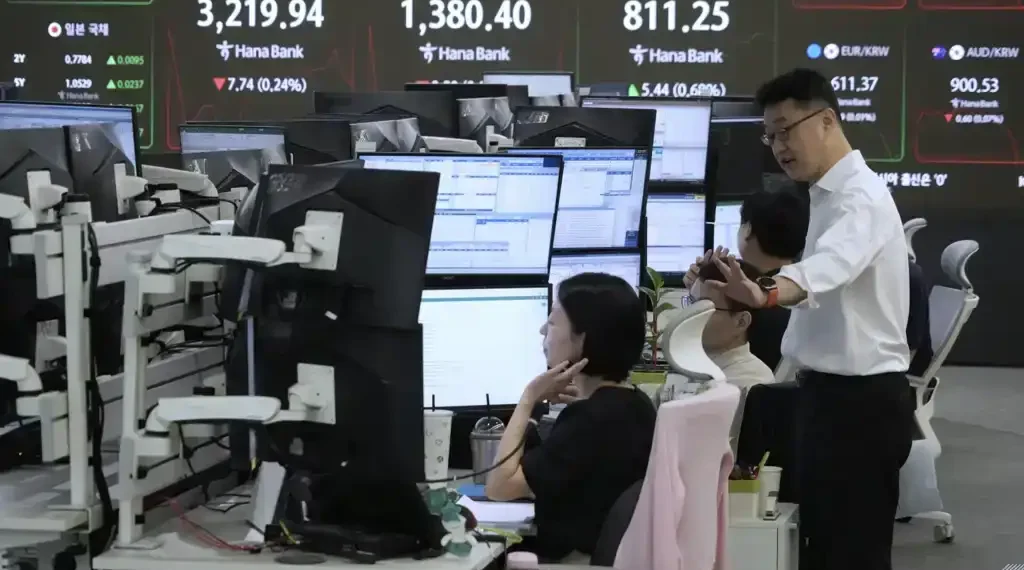Global Shares Mixed as Tokyo Nikkei Rises on Tariff Agreement
Published Time: 08-08-2025 14:00 (U.S. ET)
Global financial markets showed mixed results on Friday, with Asian stocks mostly declining, yet Tokyo’s benchmark surged after Japan and the United States resolved tariff-related uncertainties affecting exports. Meanwhile, European markets exhibited modest fluctuations amid ongoing concerns about economic momentum and trade policies.
Tokyo’s Nikkei Rises on Tariff Clarity
Japan’s Nikkei 225 index rose sharply, gaining 2.2% early in the session before settling at a 1.9% increase to 41,820.48 points. The boost came after Japanese officials confirmed that the U.S. agreed to correct discrepancies in the new tariffs that had gone into effect Thursday. These tariffs had not initially aligned with the previously agreed 15% cap.
Japanese automakers led the gains, with Toyota Motor Corp. climbing 3.5% and Honda Motor Co. rising 4%, reflecting investor confidence due to the tariff resolution. These companies rely heavily on exports to the U.S., making the tariff issue particularly impactful on their stock performance.
Mixed Performance Across Asian Markets
Despite the positive news from Japan, other Asian markets experienced declines. Hong Kong’s Hang Seng index dropped 0.9% to 24,858.82, while China’s Shanghai Composite slipped 0.1% to 3,635.13. South Korea’s Kospi decreased by 0.6% to 3,210.01, and Australia’s S&P/ASX 200 fell 0.3% to 8,807.10. India’s Sensex also saw a 0.8% decline, although Taiwan’s Taiex managed a slight 0.1% gain.
Market analyst Stephen Innes of SPI Asset Management commented on the volatility, stating, “We’re heading into a stretch where markets will punish certainty. What looks like a slam dunk on Monday can turn into a face plant by Friday.” This highlights the fragile investor sentiment amid shifting economic and geopolitical factors.
European Markets Show Minor Fluctuations
European markets traded with minor gains and losses. Germany’s DAX index fell 0.3% to 24,131.01, while France’s CAC 40 gained 0.3% to 7,730.40. The UK’s FTSE 100 edged slightly down by less than 0.1% to 9,094.65. These movements reflect cautious investor positioning as markets await further clarity on economic indicators and policy directions.
U.S. Futures and Market Indicators
Ahead of the weekend, U.S. stock futures showed moderate optimism, with the S&P 500 futures up 0.3% and Dow Jones Industrial Average futures rising 0.1%. This suggests investors are balancing concerns over recent economic data with expectations of potential Federal Reserve interest rate cuts.
Corporate Highlights and Tariff Impact
In the U.S., technology and manufacturing sectors demonstrated divergent trends influenced by tariff news and political comments. Shares of Apple rose 3.2%, buoyed by CEO Tim Cook’s announcement alongside President Trump of an additional $100 billion investment in U.S. manufacturing over the next four years. This commitment signals ongoing confidence in domestic production capabilities.
Conversely, Intel’s shares fell 3.1% after President Trump criticized the company’s CEO, calling for his resignation over alleged conflicts of interest, though no evidence was provided.
Chipmakers benefited from the president’s decision to impose 100% tariffs on imported semiconductors while exempting companies with substantial U.S. manufacturing investments. Advanced Micro Devices (AMD) shares jumped 5.7%, and Nvidia increased by 0.8%, reflecting investor optimism about domestic manufacturing incentives.
Economic Indicators and Market Sentiment
Recent U.S. employment data showed slower-than-expected job growth, intensifying concerns that President Trump’s tariffs could be hampering the economy. Despite these worries, hopes remain high for future Federal Reserve rate cuts, supported by strong corporate earnings reports.
Lower interest rates generally stimulate economic growth and stock prices but also risk increasing inflation. This is especially relevant as tariffs contribute to rising costs for consumers and businesses.
Reflecting this balance, the Bank of England recently reduced its main interest rate to support the struggling UK economy, indicating a broader global trend toward easing monetary policies amid economic uncertainties.
Commodities and Currency Markets
In commodity markets, U.S. benchmark crude oil prices increased by 16 cents to $64.04 per barrel, while Brent crude, the international benchmark, rose 19 cents to $66.61 per barrel. These modest gains follow supply concerns and fluctuating demand expectations.
Currency markets saw the U.S. dollar strengthen against the Japanese yen, moving from 147.13 to 147.66 yen, while the euro dipped slightly to $1.1639 from $1.1667. These fluctuations reflect ongoing geopolitical tensions and monetary policy differentials.
Conclusion
Global markets remain in flux amid tariff negotiations, mixed economic data, and shifting monetary policies. The resolution of the U.S.-Japan tariff dispute boosted Tokyo’s market, yet wider investor caution persists across Asia and Europe. Looking ahead, traders and analysts will monitor inflation data, Federal Reserve actions, and geopolitical developments to gauge the next direction for global financial markets.
This article was rewritten by JournosNews.com based on verified reporting from trusted sources. The content has been independently reviewed, fact-checked, and edited for accuracy, neutrality, tone, and global readability in accordance with Google News and AdSense standards.
All opinions, quotes, or statements from contributors, experts, or sourced organizations do not necessarily reflect the views of JournosNews.com. JournosNews.com maintains full editorial independence from any external funders, sponsors, or organizations.
Stay informed with JournosNews.com — your trusted source for verified global reporting and in-depth analysis. Follow us on Google News, BlueSky, and X for real-time updates.














